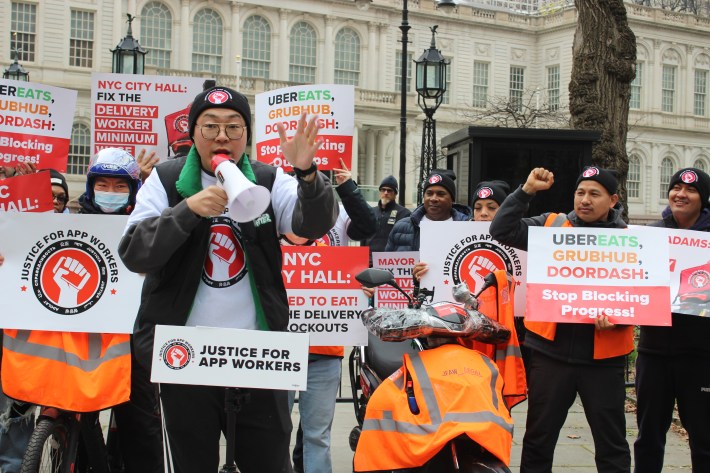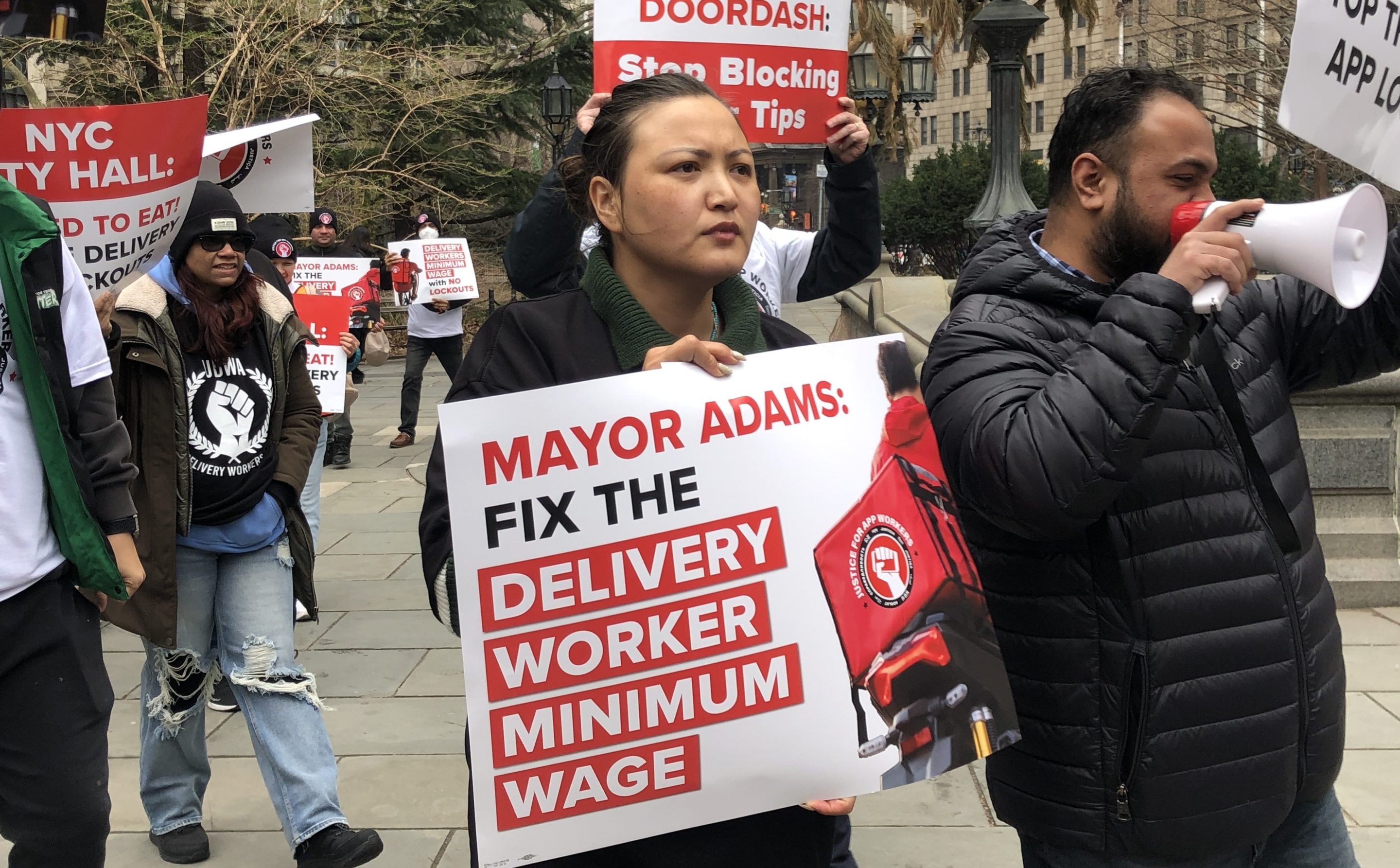Queens-based courier Dendi Sherpa was one of New York’s 65,000 delivery workers who fought hard to win a minimum wage of $17.96 for all couriers. When the minimum wage law finally went into effect last December, Sherpa celebrated.
But instead of seeing his wages increase, Sherpa, 22, said his pay has actually decreased.
Now, when he opens his Uber Eats app, the system won’t let him accept delivery jobs for hours and sometimes days, he told Streetsblog. Prior to the minimum wage law enforcement, he made approximately $600 a week on his bike. Now, due to limited access to the app, he said he makes half that.
He’s not alone. On Wednesday morning, nearly 20 delivery workers, some on e-bikes and mopeds, took to City Hall Park to protest what they are calling "lockouts."
“I used to work 35 hours a week, but in January, I took a couple of days off because I had a bad cold,” Sherpa told Streetsblog in Hindi through a translator. “When I got back on the Uber Eats app, I was only given 19 hours of work a week, which has been really difficult for me. This is why I’m calling on the city to help us.”
Justice for App Workers, the organization representing more than 130,000 rideshare drivers and delivery workers across the country, called the protest to demand that the city hold the app giants accountable.
“Delivery drivers across the city are experiencing crippling lockout conditions, depriving them of the opportunity to earn a living wage,” Co-Chair and courier Naomi Ogutu said. “But we refuse to accept this as the status quo. We are here to demand immediate action from Mayor Adams and the City Council.”
New York delivery workers have had enough of the app companies’ greed. We work extremely hard, and we're not asking for a handout - we just want the fair pay we've earned.
— Justice For App Workers (@StandWithJFAW) March 27, 2024
We know @NYCMayor and @helloDCWP want to help workers, and we're calling on them to act now! pic.twitter.com/rJ5irAPf1d
Specifically, protestors want the city to protect their interests and for the apps to let them work more hours.
The confusion over pay and the delivery companies' behavior stems from the City Council's effort three years ago to set a minimum wage for delivery workers. The Council initially proposed a minimum wage that would, over time, top out at $23.82 an hour, but the hourly wage was bumped down to $19.96 in March 2023 by Mayor Adams after intense pushback from several app delivery companies. Comptroller Brad Lander and other critics said the minimum wage was rolled back because Adams surrendered to corporate lobbying.
A spokesperson for the Department of Consumer and Worker Protection said that mass lockouts are not occurring, adding that since the pay rate went into effect, some of the apps have started scheduling workers for shifts.
“As we continue to support them and protect their rights, DCWP is monitoring the apps’ compliance with the minimum pay rate. Any worker who has questions or concerns should reach out to us at nyc.gov/DeliveryApps or call 311,” spokesperson Michael Lanza said.
Representatives for the app companies blamed the city for any negative outcomes of the minimum wage law.
“I’m not surprised workers are upset,” Hayley Prim, senior policy manager at Uber told Streetsblog. “When New York City created this wage law, they predicted that apps would limit access to their platform in order to comply with the new utilization based standard.”
A DoorDash spokesperson said there’s a difference between a lockout and just a lack of work.
“When the City implemented such an extreme minimum pay rate, we had to make changes on how New York City Dashers can access our platform,” the DoorDash spokesperson said via email. "But it’s simply false to claim there are any ‘lockouts’ on the DoorDash platform."
Whether semantics or not, the protestors use the term "lockout" to describe their interactions with the apps, claiming the companies have imposed punitive measures since the law took effect. Several delivery workers told Streetsblog that companies including Uber Eats have moved the option to leave a tip to the very end of the transaction, resulting in lower tips.
“The minimum wage is a very good thing, but the lockouts need to be fixed immediately,” said Dauchan Nie, a former courier and current co-chair of Justice for App Workers. “The workers cannot make money now. It’s an emergency. Everyone needs to feed their families.
“We’re stuck wondering, ‘Where is the justice in this?’” Nie added.







